Strategic Goal and Leadership in Advanced Mental Health Nursing
VerifiedAdded on 2023/01/10
|17
|5306
|27
Essay
AI Summary
This essay examines the strategic goals and leadership attributes within advanced mental health nursing, focusing on the Peninsula Health Strategic Plan for 2013-2018. The paper emphasizes the importance of person-centered care, detailing its principles and benefits in improving patient experiences and outcomes. It explores the development strategy based on the eight principles of person-centered care, highlighting the need for leadership at different levels to improve patient experiences and measuring, reporting, and evaluating on the performance. The essay also addresses the significance of collaboration, effective communication, and addressing health determinants to provide holistic care. The paper highlights the importance of leadership skills, patient surveys, and feedback mechanisms to improve the delivery of mental health services, ultimately advocating for a patient-centric approach to care and recovery.

Running head: HEALTHCARE
Management and Leadership of Professional Nursing
Name of the Student
Name of the University
Author Note
Management and Leadership of Professional Nursing
Name of the Student
Name of the University
Author Note
Paraphrase This Document
Need a fresh take? Get an instant paraphrase of this document with our AI Paraphraser
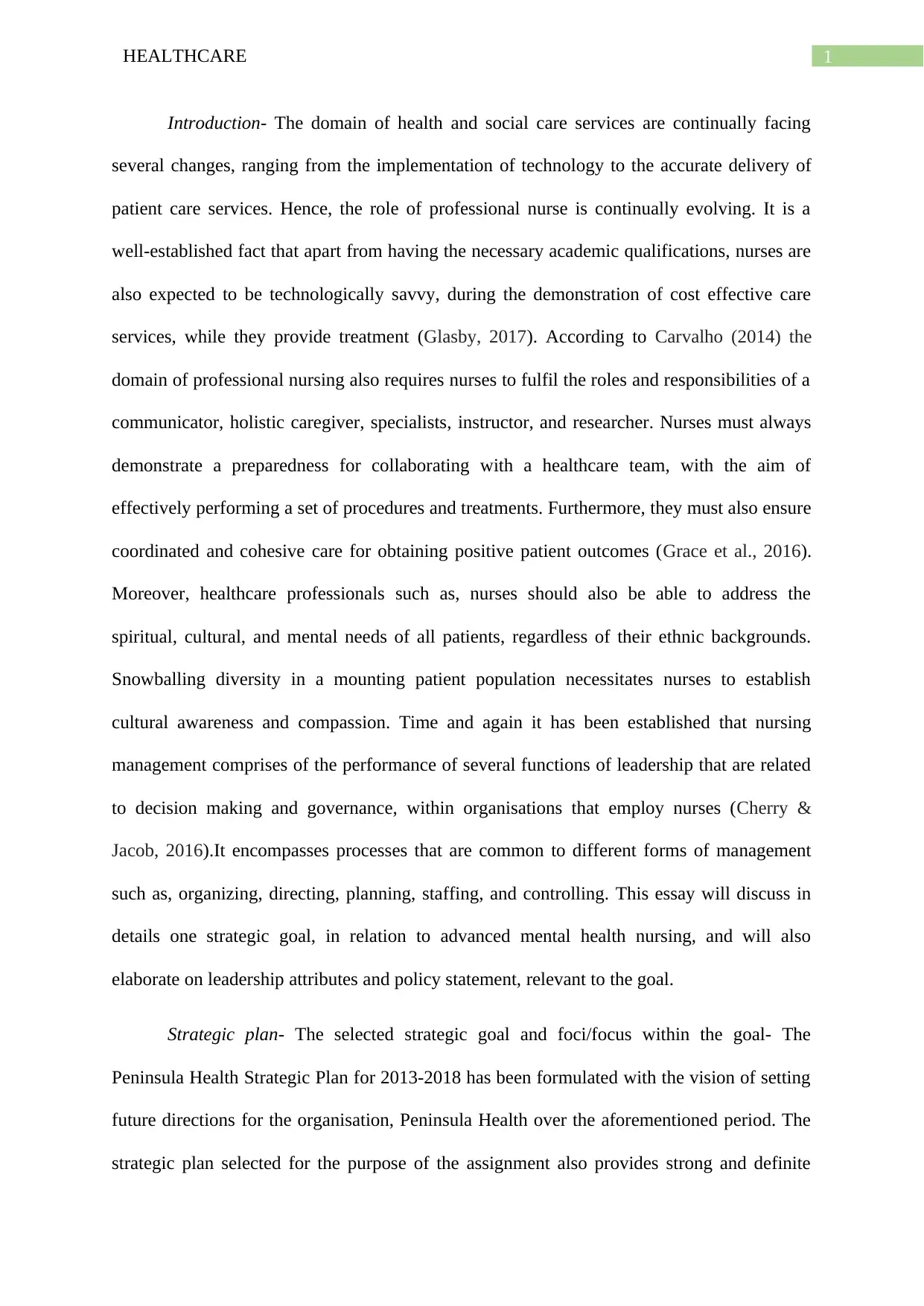
1HEALTHCARE
Introduction- The domain of health and social care services are continually facing
several changes, ranging from the implementation of technology to the accurate delivery of
patient care services. Hence, the role of professional nurse is continually evolving. It is a
well-established fact that apart from having the necessary academic qualifications, nurses are
also expected to be technologically savvy, during the demonstration of cost effective care
services, while they provide treatment (Glasby, 2017). According to Carvalho (2014) the
domain of professional nursing also requires nurses to fulfil the roles and responsibilities of a
communicator, holistic caregiver, specialists, instructor, and researcher. Nurses must always
demonstrate a preparedness for collaborating with a healthcare team, with the aim of
effectively performing a set of procedures and treatments. Furthermore, they must also ensure
coordinated and cohesive care for obtaining positive patient outcomes (Grace et al., 2016).
Moreover, healthcare professionals such as, nurses should also be able to address the
spiritual, cultural, and mental needs of all patients, regardless of their ethnic backgrounds.
Snowballing diversity in a mounting patient population necessitates nurses to establish
cultural awareness and compassion. Time and again it has been established that nursing
management comprises of the performance of several functions of leadership that are related
to decision making and governance, within organisations that employ nurses (Cherry &
Jacob, 2016).It encompasses processes that are common to different forms of management
such as, organizing, directing, planning, staffing, and controlling. This essay will discuss in
details one strategic goal, in relation to advanced mental health nursing, and will also
elaborate on leadership attributes and policy statement, relevant to the goal.
Strategic plan- The selected strategic goal and foci/focus within the goal- The
Peninsula Health Strategic Plan for 2013-2018 has been formulated with the vision of setting
future directions for the organisation, Peninsula Health over the aforementioned period. The
strategic plan selected for the purpose of the assignment also provides strong and definite
Introduction- The domain of health and social care services are continually facing
several changes, ranging from the implementation of technology to the accurate delivery of
patient care services. Hence, the role of professional nurse is continually evolving. It is a
well-established fact that apart from having the necessary academic qualifications, nurses are
also expected to be technologically savvy, during the demonstration of cost effective care
services, while they provide treatment (Glasby, 2017). According to Carvalho (2014) the
domain of professional nursing also requires nurses to fulfil the roles and responsibilities of a
communicator, holistic caregiver, specialists, instructor, and researcher. Nurses must always
demonstrate a preparedness for collaborating with a healthcare team, with the aim of
effectively performing a set of procedures and treatments. Furthermore, they must also ensure
coordinated and cohesive care for obtaining positive patient outcomes (Grace et al., 2016).
Moreover, healthcare professionals such as, nurses should also be able to address the
spiritual, cultural, and mental needs of all patients, regardless of their ethnic backgrounds.
Snowballing diversity in a mounting patient population necessitates nurses to establish
cultural awareness and compassion. Time and again it has been established that nursing
management comprises of the performance of several functions of leadership that are related
to decision making and governance, within organisations that employ nurses (Cherry &
Jacob, 2016).It encompasses processes that are common to different forms of management
such as, organizing, directing, planning, staffing, and controlling. This essay will discuss in
details one strategic goal, in relation to advanced mental health nursing, and will also
elaborate on leadership attributes and policy statement, relevant to the goal.
Strategic plan- The selected strategic goal and foci/focus within the goal- The
Peninsula Health Strategic Plan for 2013-2018 has been formulated with the vision of setting
future directions for the organisation, Peninsula Health over the aforementioned period. The
strategic plan selected for the purpose of the assignment also provides strong and definite
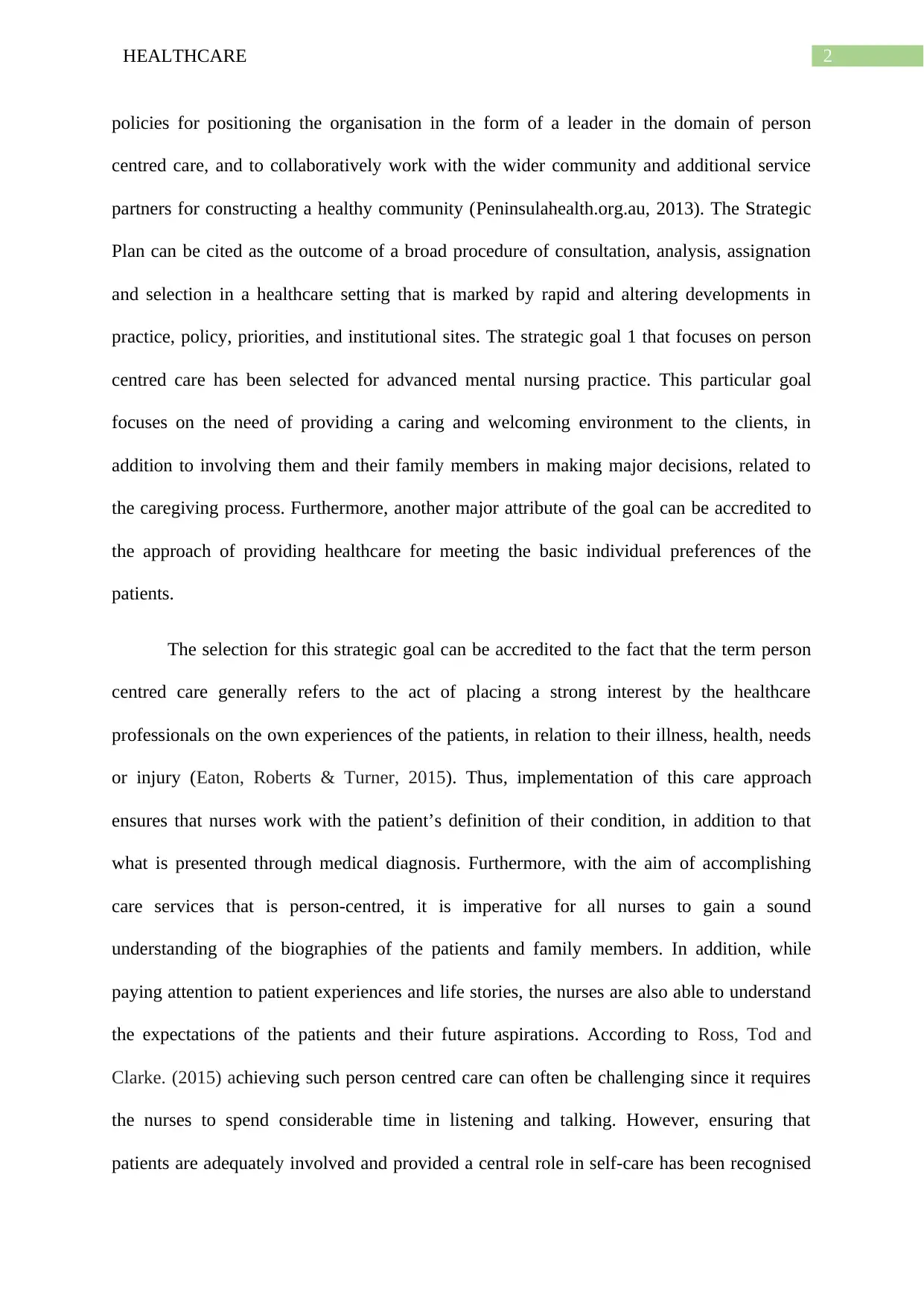
2HEALTHCARE
policies for positioning the organisation in the form of a leader in the domain of person
centred care, and to collaboratively work with the wider community and additional service
partners for constructing a healthy community (Peninsulahealth.org.au, 2013). The Strategic
Plan can be cited as the outcome of a broad procedure of consultation, analysis, assignation
and selection in a healthcare setting that is marked by rapid and altering developments in
practice, policy, priorities, and institutional sites. The strategic goal 1 that focuses on person
centred care has been selected for advanced mental nursing practice. This particular goal
focuses on the need of providing a caring and welcoming environment to the clients, in
addition to involving them and their family members in making major decisions, related to
the caregiving process. Furthermore, another major attribute of the goal can be accredited to
the approach of providing healthcare for meeting the basic individual preferences of the
patients.
The selection for this strategic goal can be accredited to the fact that the term person
centred care generally refers to the act of placing a strong interest by the healthcare
professionals on the own experiences of the patients, in relation to their illness, health, needs
or injury (Eaton, Roberts & Turner, 2015). Thus, implementation of this care approach
ensures that nurses work with the patient’s definition of their condition, in addition to that
what is presented through medical diagnosis. Furthermore, with the aim of accomplishing
care services that is person-centred, it is imperative for all nurses to gain a sound
understanding of the biographies of the patients and family members. In addition, while
paying attention to patient experiences and life stories, the nurses are also able to understand
the expectations of the patients and their future aspirations. According to Ross, Tod and
Clarke. (2015) achieving such person centred care can often be challenging since it requires
the nurses to spend considerable time in listening and talking. However, ensuring that
patients are adequately involved and provided a central role in self-care has been recognised
policies for positioning the organisation in the form of a leader in the domain of person
centred care, and to collaboratively work with the wider community and additional service
partners for constructing a healthy community (Peninsulahealth.org.au, 2013). The Strategic
Plan can be cited as the outcome of a broad procedure of consultation, analysis, assignation
and selection in a healthcare setting that is marked by rapid and altering developments in
practice, policy, priorities, and institutional sites. The strategic goal 1 that focuses on person
centred care has been selected for advanced mental nursing practice. This particular goal
focuses on the need of providing a caring and welcoming environment to the clients, in
addition to involving them and their family members in making major decisions, related to
the caregiving process. Furthermore, another major attribute of the goal can be accredited to
the approach of providing healthcare for meeting the basic individual preferences of the
patients.
The selection for this strategic goal can be accredited to the fact that the term person
centred care generally refers to the act of placing a strong interest by the healthcare
professionals on the own experiences of the patients, in relation to their illness, health, needs
or injury (Eaton, Roberts & Turner, 2015). Thus, implementation of this care approach
ensures that nurses work with the patient’s definition of their condition, in addition to that
what is presented through medical diagnosis. Furthermore, with the aim of accomplishing
care services that is person-centred, it is imperative for all nurses to gain a sound
understanding of the biographies of the patients and family members. In addition, while
paying attention to patient experiences and life stories, the nurses are also able to understand
the expectations of the patients and their future aspirations. According to Ross, Tod and
Clarke. (2015) achieving such person centred care can often be challenging since it requires
the nurses to spend considerable time in listening and talking. However, ensuring that
patients are adequately involved and provided a central role in self-care has been recognised
⊘ This is a preview!⊘
Do you want full access?
Subscribe today to unlock all pages.

Trusted by 1+ million students worldwide
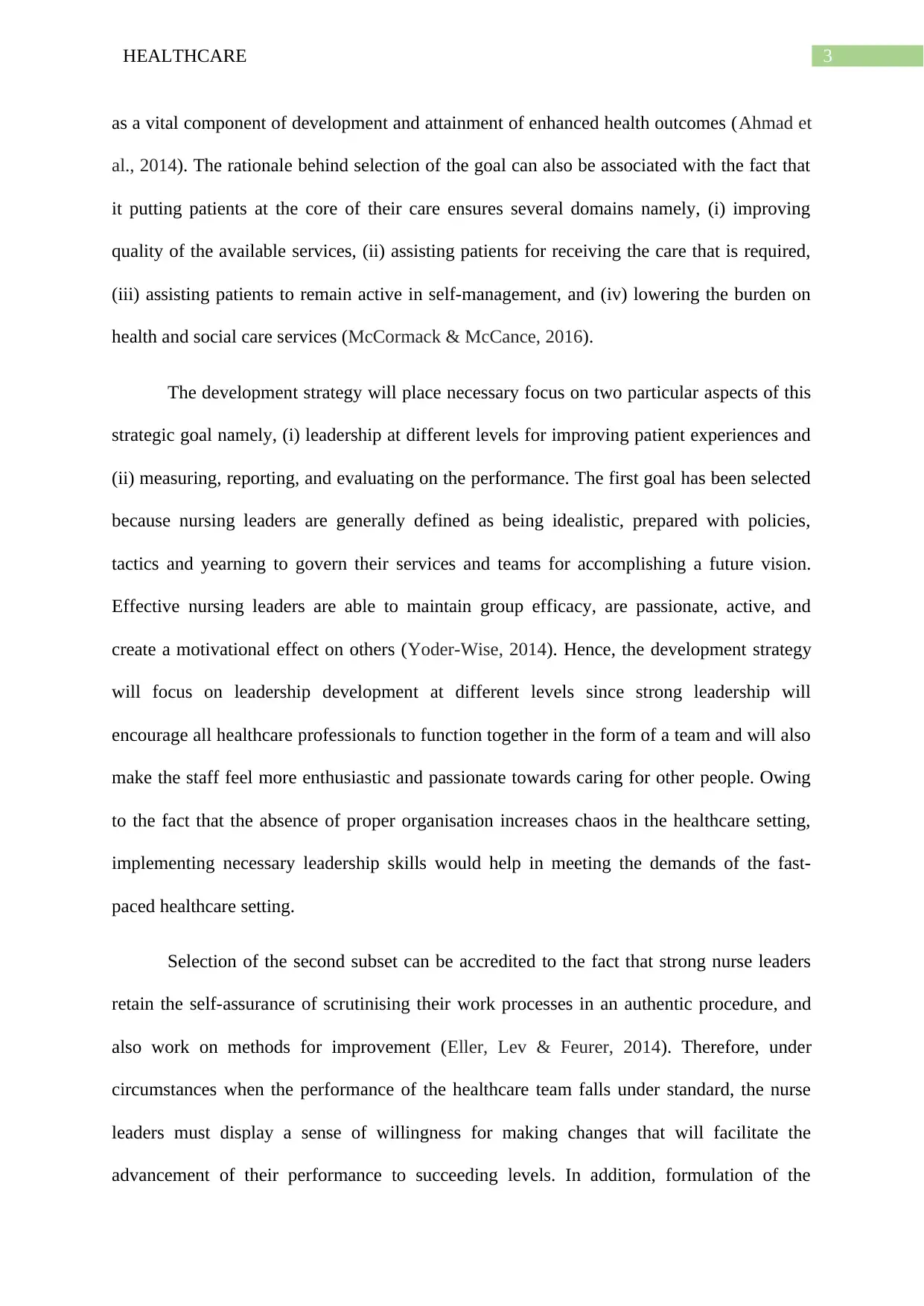
3HEALTHCARE
as a vital component of development and attainment of enhanced health outcomes (Ahmad et
al., 2014). The rationale behind selection of the goal can also be associated with the fact that
it putting patients at the core of their care ensures several domains namely, (i) improving
quality of the available services, (ii) assisting patients for receiving the care that is required,
(iii) assisting patients to remain active in self-management, and (iv) lowering the burden on
health and social care services (McCormack & McCance, 2016).
The development strategy will place necessary focus on two particular aspects of this
strategic goal namely, (i) leadership at different levels for improving patient experiences and
(ii) measuring, reporting, and evaluating on the performance. The first goal has been selected
because nursing leaders are generally defined as being idealistic, prepared with policies,
tactics and yearning to govern their services and teams for accomplishing a future vision.
Effective nursing leaders are able to maintain group efficacy, are passionate, active, and
create a motivational effect on others (Yoder-Wise, 2014). Hence, the development strategy
will focus on leadership development at different levels since strong leadership will
encourage all healthcare professionals to function together in the form of a team and will also
make the staff feel more enthusiastic and passionate towards caring for other people. Owing
to the fact that the absence of proper organisation increases chaos in the healthcare setting,
implementing necessary leadership skills would help in meeting the demands of the fast-
paced healthcare setting.
Selection of the second subset can be accredited to the fact that strong nurse leaders
retain the self-assurance of scrutinising their work processes in an authentic procedure, and
also work on methods for improvement (Eller, Lev & Feurer, 2014). Therefore, under
circumstances when the performance of the healthcare team falls under standard, the nurse
leaders must display a sense of willingness for making changes that will facilitate the
advancement of their performance to succeeding levels. In addition, formulation of the
as a vital component of development and attainment of enhanced health outcomes (Ahmad et
al., 2014). The rationale behind selection of the goal can also be associated with the fact that
it putting patients at the core of their care ensures several domains namely, (i) improving
quality of the available services, (ii) assisting patients for receiving the care that is required,
(iii) assisting patients to remain active in self-management, and (iv) lowering the burden on
health and social care services (McCormack & McCance, 2016).
The development strategy will place necessary focus on two particular aspects of this
strategic goal namely, (i) leadership at different levels for improving patient experiences and
(ii) measuring, reporting, and evaluating on the performance. The first goal has been selected
because nursing leaders are generally defined as being idealistic, prepared with policies,
tactics and yearning to govern their services and teams for accomplishing a future vision.
Effective nursing leaders are able to maintain group efficacy, are passionate, active, and
create a motivational effect on others (Yoder-Wise, 2014). Hence, the development strategy
will focus on leadership development at different levels since strong leadership will
encourage all healthcare professionals to function together in the form of a team and will also
make the staff feel more enthusiastic and passionate towards caring for other people. Owing
to the fact that the absence of proper organisation increases chaos in the healthcare setting,
implementing necessary leadership skills would help in meeting the demands of the fast-
paced healthcare setting.
Selection of the second subset can be accredited to the fact that strong nurse leaders
retain the self-assurance of scrutinising their work processes in an authentic procedure, and
also work on methods for improvement (Eller, Lev & Feurer, 2014). Therefore, under
circumstances when the performance of the healthcare team falls under standard, the nurse
leaders must display a sense of willingness for making changes that will facilitate the
advancement of their performance to succeeding levels. In addition, formulation of the
Paraphrase This Document
Need a fresh take? Get an instant paraphrase of this document with our AI Paraphraser
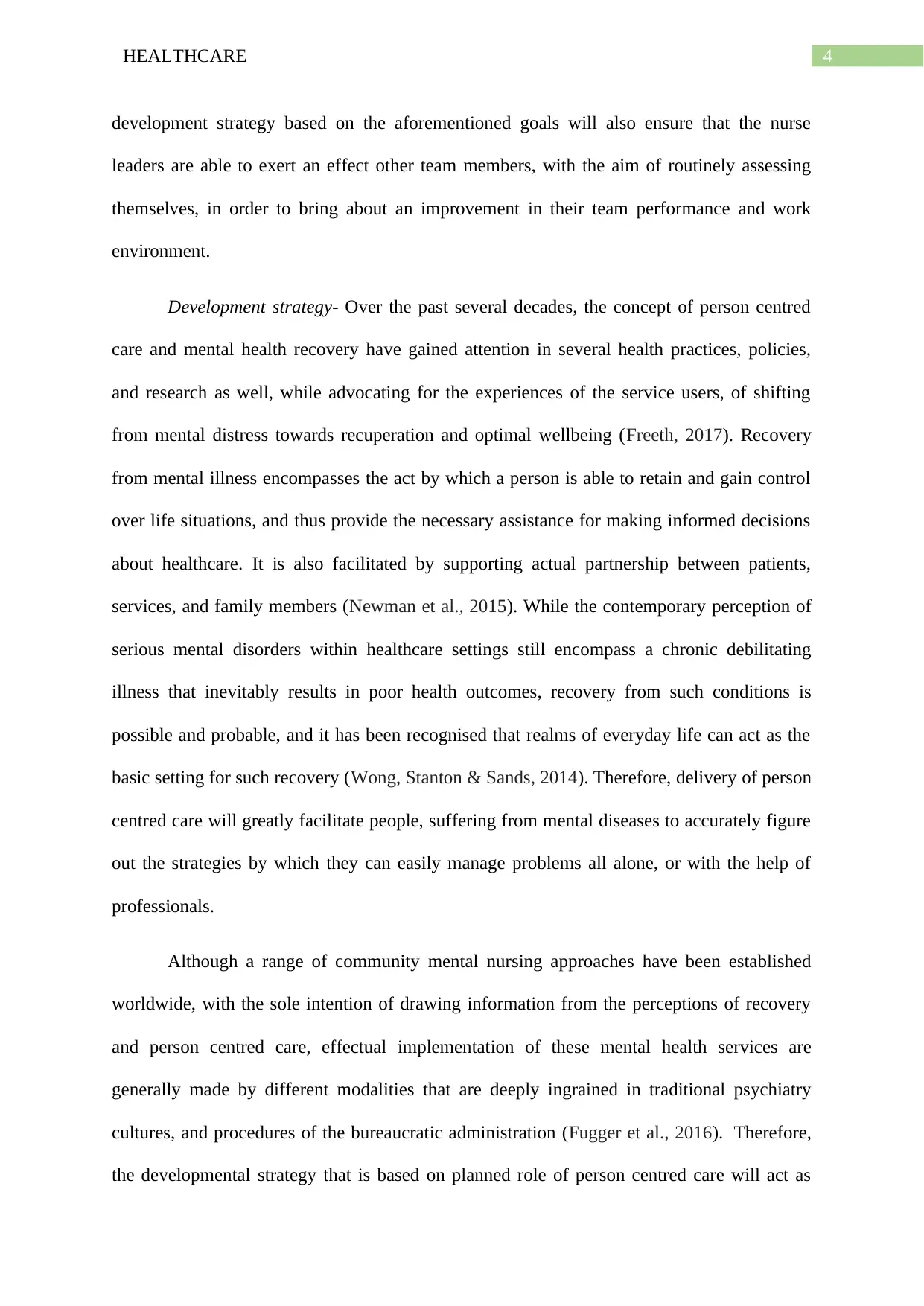
4HEALTHCARE
development strategy based on the aforementioned goals will also ensure that the nurse
leaders are able to exert an effect other team members, with the aim of routinely assessing
themselves, in order to bring about an improvement in their team performance and work
environment.
Development strategy- Over the past several decades, the concept of person centred
care and mental health recovery have gained attention in several health practices, policies,
and research as well, while advocating for the experiences of the service users, of shifting
from mental distress towards recuperation and optimal wellbeing (Freeth, 2017). Recovery
from mental illness encompasses the act by which a person is able to retain and gain control
over life situations, and thus provide the necessary assistance for making informed decisions
about healthcare. It is also facilitated by supporting actual partnership between patients,
services, and family members (Newman et al., 2015). While the contemporary perception of
serious mental disorders within healthcare settings still encompass a chronic debilitating
illness that inevitably results in poor health outcomes, recovery from such conditions is
possible and probable, and it has been recognised that realms of everyday life can act as the
basic setting for such recovery (Wong, Stanton & Sands, 2014). Therefore, delivery of person
centred care will greatly facilitate people, suffering from mental diseases to accurately figure
out the strategies by which they can easily manage problems all alone, or with the help of
professionals.
Although a range of community mental nursing approaches have been established
worldwide, with the sole intention of drawing information from the perceptions of recovery
and person centred care, effectual implementation of these mental health services are
generally made by different modalities that are deeply ingrained in traditional psychiatry
cultures, and procedures of the bureaucratic administration (Fugger et al., 2016). Therefore,
the developmental strategy that is based on planned role of person centred care will act as
development strategy based on the aforementioned goals will also ensure that the nurse
leaders are able to exert an effect other team members, with the aim of routinely assessing
themselves, in order to bring about an improvement in their team performance and work
environment.
Development strategy- Over the past several decades, the concept of person centred
care and mental health recovery have gained attention in several health practices, policies,
and research as well, while advocating for the experiences of the service users, of shifting
from mental distress towards recuperation and optimal wellbeing (Freeth, 2017). Recovery
from mental illness encompasses the act by which a person is able to retain and gain control
over life situations, and thus provide the necessary assistance for making informed decisions
about healthcare. It is also facilitated by supporting actual partnership between patients,
services, and family members (Newman et al., 2015). While the contemporary perception of
serious mental disorders within healthcare settings still encompass a chronic debilitating
illness that inevitably results in poor health outcomes, recovery from such conditions is
possible and probable, and it has been recognised that realms of everyday life can act as the
basic setting for such recovery (Wong, Stanton & Sands, 2014). Therefore, delivery of person
centred care will greatly facilitate people, suffering from mental diseases to accurately figure
out the strategies by which they can easily manage problems all alone, or with the help of
professionals.
Although a range of community mental nursing approaches have been established
worldwide, with the sole intention of drawing information from the perceptions of recovery
and person centred care, effectual implementation of these mental health services are
generally made by different modalities that are deeply ingrained in traditional psychiatry
cultures, and procedures of the bureaucratic administration (Fugger et al., 2016). Therefore,
the developmental strategy that is based on planned role of person centred care will act as
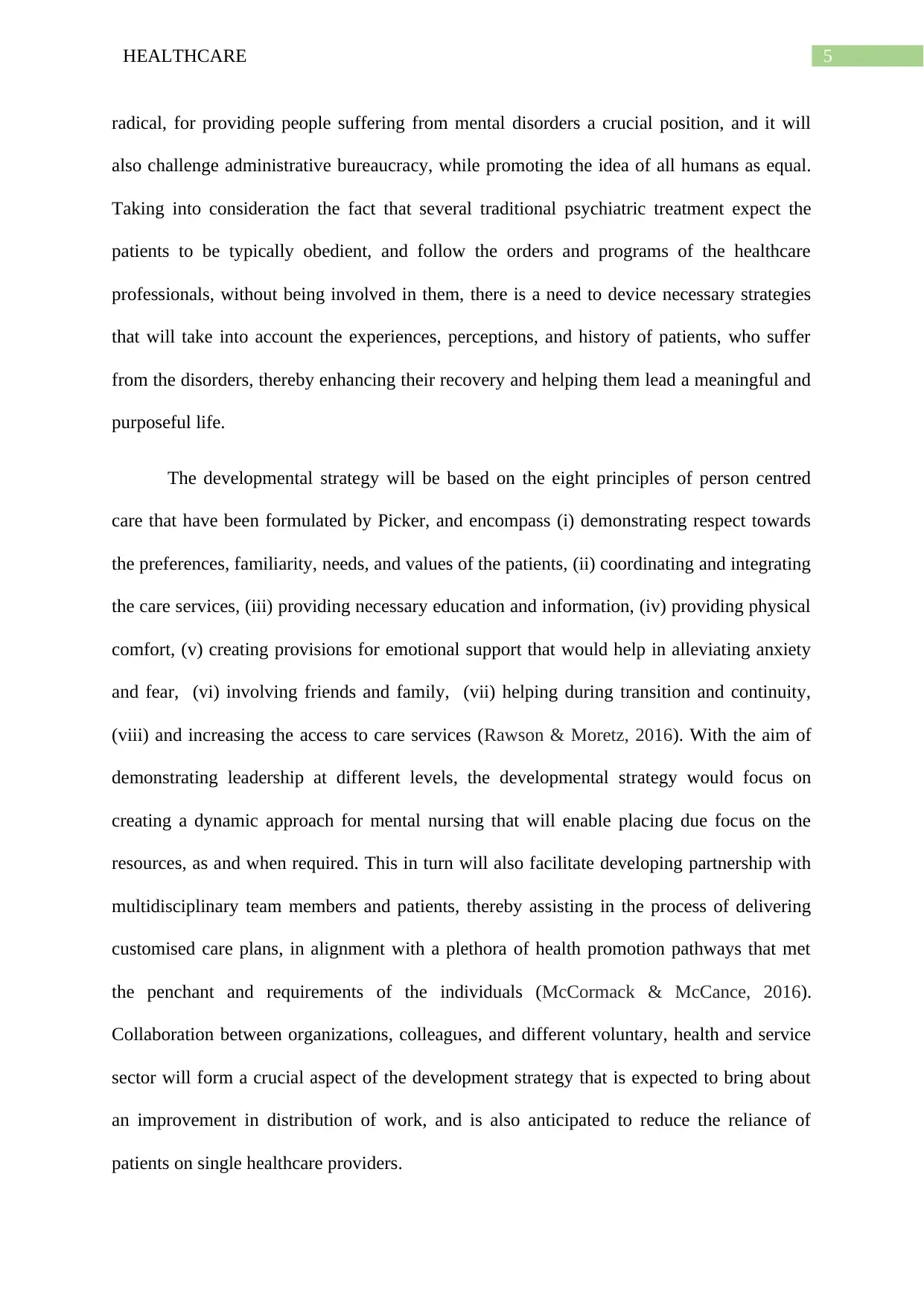
5HEALTHCARE
radical, for providing people suffering from mental disorders a crucial position, and it will
also challenge administrative bureaucracy, while promoting the idea of all humans as equal.
Taking into consideration the fact that several traditional psychiatric treatment expect the
patients to be typically obedient, and follow the orders and programs of the healthcare
professionals, without being involved in them, there is a need to device necessary strategies
that will take into account the experiences, perceptions, and history of patients, who suffer
from the disorders, thereby enhancing their recovery and helping them lead a meaningful and
purposeful life.
The developmental strategy will be based on the eight principles of person centred
care that have been formulated by Picker, and encompass (i) demonstrating respect towards
the preferences, familiarity, needs, and values of the patients, (ii) coordinating and integrating
the care services, (iii) providing necessary education and information, (iv) providing physical
comfort, (v) creating provisions for emotional support that would help in alleviating anxiety
and fear, (vi) involving friends and family, (vii) helping during transition and continuity,
(viii) and increasing the access to care services (Rawson & Moretz, 2016). With the aim of
demonstrating leadership at different levels, the developmental strategy would focus on
creating a dynamic approach for mental nursing that will enable placing due focus on the
resources, as and when required. This in turn will also facilitate developing partnership with
multidisciplinary team members and patients, thereby assisting in the process of delivering
customised care plans, in alignment with a plethora of health promotion pathways that met
the penchant and requirements of the individuals (McCormack & McCance, 2016).
Collaboration between organizations, colleagues, and different voluntary, health and service
sector will form a crucial aspect of the development strategy that is expected to bring about
an improvement in distribution of work, and is also anticipated to reduce the reliance of
patients on single healthcare providers.
radical, for providing people suffering from mental disorders a crucial position, and it will
also challenge administrative bureaucracy, while promoting the idea of all humans as equal.
Taking into consideration the fact that several traditional psychiatric treatment expect the
patients to be typically obedient, and follow the orders and programs of the healthcare
professionals, without being involved in them, there is a need to device necessary strategies
that will take into account the experiences, perceptions, and history of patients, who suffer
from the disorders, thereby enhancing their recovery and helping them lead a meaningful and
purposeful life.
The developmental strategy will be based on the eight principles of person centred
care that have been formulated by Picker, and encompass (i) demonstrating respect towards
the preferences, familiarity, needs, and values of the patients, (ii) coordinating and integrating
the care services, (iii) providing necessary education and information, (iv) providing physical
comfort, (v) creating provisions for emotional support that would help in alleviating anxiety
and fear, (vi) involving friends and family, (vii) helping during transition and continuity,
(viii) and increasing the access to care services (Rawson & Moretz, 2016). With the aim of
demonstrating leadership at different levels, the developmental strategy would focus on
creating a dynamic approach for mental nursing that will enable placing due focus on the
resources, as and when required. This in turn will also facilitate developing partnership with
multidisciplinary team members and patients, thereby assisting in the process of delivering
customised care plans, in alignment with a plethora of health promotion pathways that met
the penchant and requirements of the individuals (McCormack & McCance, 2016).
Collaboration between organizations, colleagues, and different voluntary, health and service
sector will form a crucial aspect of the development strategy that is expected to bring about
an improvement in distribution of work, and is also anticipated to reduce the reliance of
patients on single healthcare providers.
⊘ This is a preview!⊘
Do you want full access?
Subscribe today to unlock all pages.

Trusted by 1+ million students worldwide
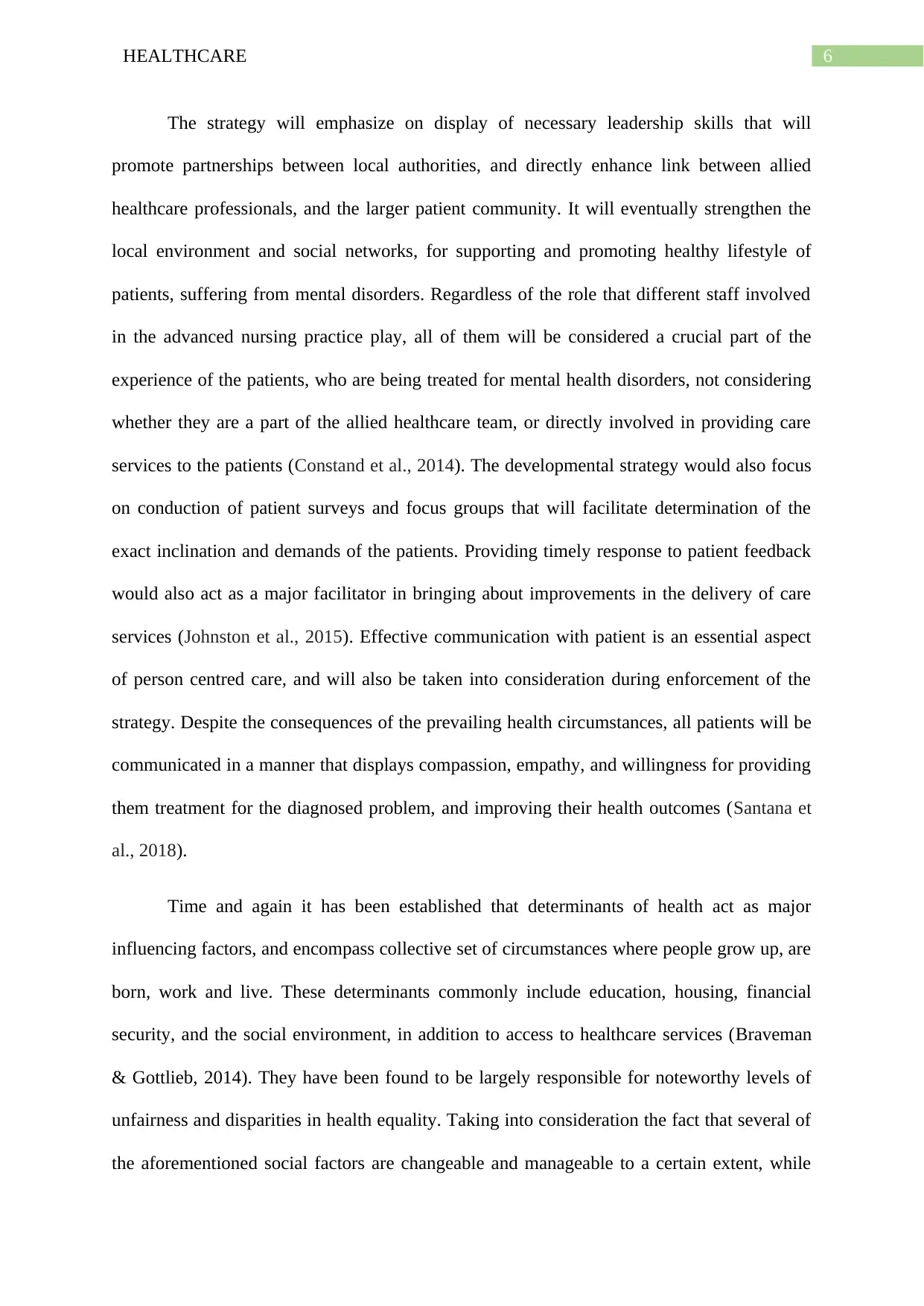
6HEALTHCARE
The strategy will emphasize on display of necessary leadership skills that will
promote partnerships between local authorities, and directly enhance link between allied
healthcare professionals, and the larger patient community. It will eventually strengthen the
local environment and social networks, for supporting and promoting healthy lifestyle of
patients, suffering from mental disorders. Regardless of the role that different staff involved
in the advanced nursing practice play, all of them will be considered a crucial part of the
experience of the patients, who are being treated for mental health disorders, not considering
whether they are a part of the allied healthcare team, or directly involved in providing care
services to the patients (Constand et al., 2014). The developmental strategy would also focus
on conduction of patient surveys and focus groups that will facilitate determination of the
exact inclination and demands of the patients. Providing timely response to patient feedback
would also act as a major facilitator in bringing about improvements in the delivery of care
services (Johnston et al., 2015). Effective communication with patient is an essential aspect
of person centred care, and will also be taken into consideration during enforcement of the
strategy. Despite the consequences of the prevailing health circumstances, all patients will be
communicated in a manner that displays compassion, empathy, and willingness for providing
them treatment for the diagnosed problem, and improving their health outcomes (Santana et
al., 2018).
Time and again it has been established that determinants of health act as major
influencing factors, and encompass collective set of circumstances where people grow up, are
born, work and live. These determinants commonly include education, housing, financial
security, and the social environment, in addition to access to healthcare services (Braveman
& Gottlieb, 2014). They have been found to be largely responsible for noteworthy levels of
unfairness and disparities in health equality. Taking into consideration the fact that several of
the aforementioned social factors are changeable and manageable to a certain extent, while
The strategy will emphasize on display of necessary leadership skills that will
promote partnerships between local authorities, and directly enhance link between allied
healthcare professionals, and the larger patient community. It will eventually strengthen the
local environment and social networks, for supporting and promoting healthy lifestyle of
patients, suffering from mental disorders. Regardless of the role that different staff involved
in the advanced nursing practice play, all of them will be considered a crucial part of the
experience of the patients, who are being treated for mental health disorders, not considering
whether they are a part of the allied healthcare team, or directly involved in providing care
services to the patients (Constand et al., 2014). The developmental strategy would also focus
on conduction of patient surveys and focus groups that will facilitate determination of the
exact inclination and demands of the patients. Providing timely response to patient feedback
would also act as a major facilitator in bringing about improvements in the delivery of care
services (Johnston et al., 2015). Effective communication with patient is an essential aspect
of person centred care, and will also be taken into consideration during enforcement of the
strategy. Despite the consequences of the prevailing health circumstances, all patients will be
communicated in a manner that displays compassion, empathy, and willingness for providing
them treatment for the diagnosed problem, and improving their health outcomes (Santana et
al., 2018).
Time and again it has been established that determinants of health act as major
influencing factors, and encompass collective set of circumstances where people grow up, are
born, work and live. These determinants commonly include education, housing, financial
security, and the social environment, in addition to access to healthcare services (Braveman
& Gottlieb, 2014). They have been found to be largely responsible for noteworthy levels of
unfairness and disparities in health equality. Taking into consideration the fact that several of
the aforementioned social factors are changeable and manageable to a certain extent, while
Paraphrase This Document
Need a fresh take? Get an instant paraphrase of this document with our AI Paraphraser
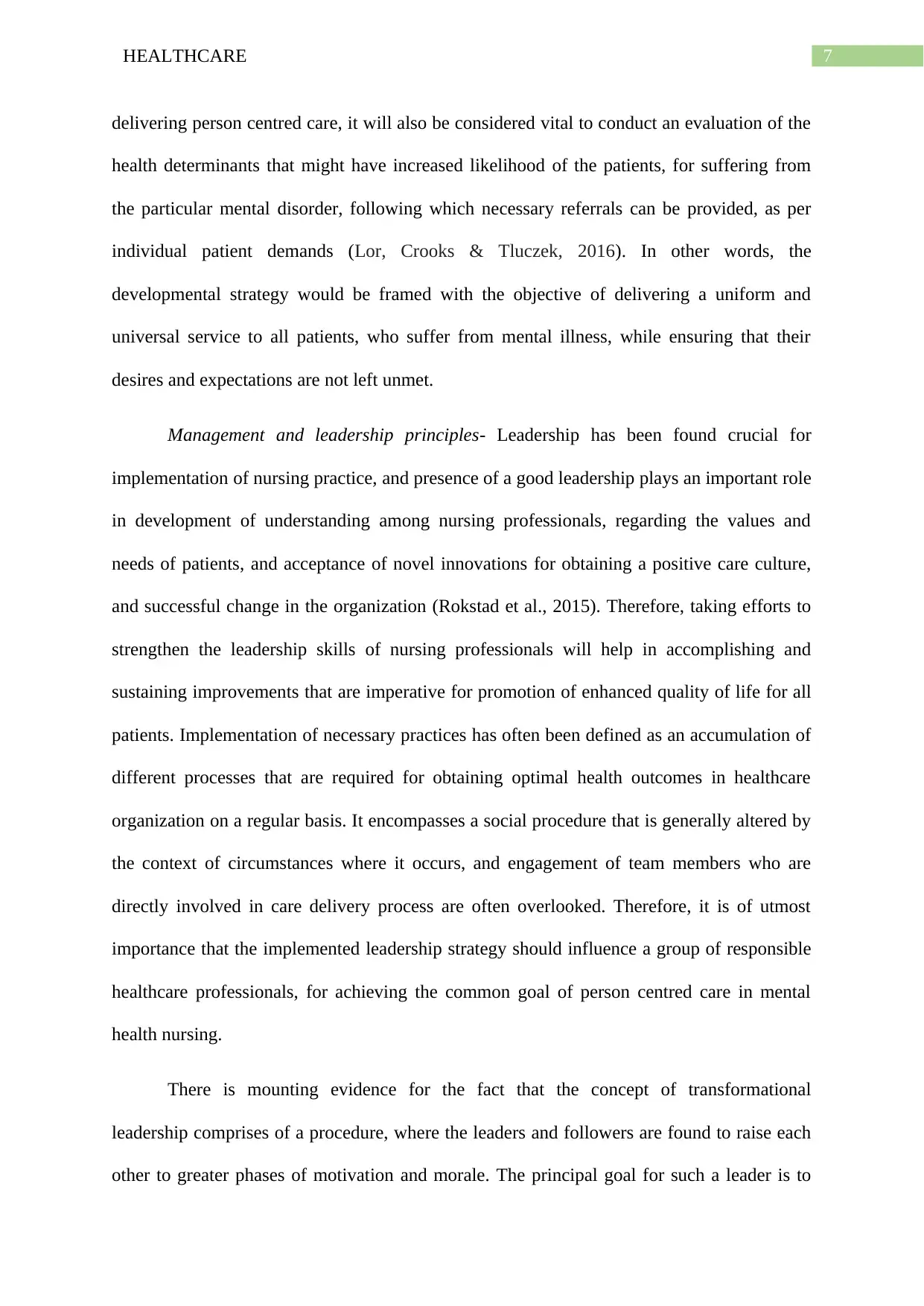
7HEALTHCARE
delivering person centred care, it will also be considered vital to conduct an evaluation of the
health determinants that might have increased likelihood of the patients, for suffering from
the particular mental disorder, following which necessary referrals can be provided, as per
individual patient demands (Lor, Crooks & Tluczek, 2016). In other words, the
developmental strategy would be framed with the objective of delivering a uniform and
universal service to all patients, who suffer from mental illness, while ensuring that their
desires and expectations are not left unmet.
Management and leadership principles- Leadership has been found crucial for
implementation of nursing practice, and presence of a good leadership plays an important role
in development of understanding among nursing professionals, regarding the values and
needs of patients, and acceptance of novel innovations for obtaining a positive care culture,
and successful change in the organization (Rokstad et al., 2015). Therefore, taking efforts to
strengthen the leadership skills of nursing professionals will help in accomplishing and
sustaining improvements that are imperative for promotion of enhanced quality of life for all
patients. Implementation of necessary practices has often been defined as an accumulation of
different processes that are required for obtaining optimal health outcomes in healthcare
organization on a regular basis. It encompasses a social procedure that is generally altered by
the context of circumstances where it occurs, and engagement of team members who are
directly involved in care delivery process are often overlooked. Therefore, it is of utmost
importance that the implemented leadership strategy should influence a group of responsible
healthcare professionals, for achieving the common goal of person centred care in mental
health nursing.
There is mounting evidence for the fact that the concept of transformational
leadership comprises of a procedure, where the leaders and followers are found to raise each
other to greater phases of motivation and morale. The principal goal for such a leader is to
delivering person centred care, it will also be considered vital to conduct an evaluation of the
health determinants that might have increased likelihood of the patients, for suffering from
the particular mental disorder, following which necessary referrals can be provided, as per
individual patient demands (Lor, Crooks & Tluczek, 2016). In other words, the
developmental strategy would be framed with the objective of delivering a uniform and
universal service to all patients, who suffer from mental illness, while ensuring that their
desires and expectations are not left unmet.
Management and leadership principles- Leadership has been found crucial for
implementation of nursing practice, and presence of a good leadership plays an important role
in development of understanding among nursing professionals, regarding the values and
needs of patients, and acceptance of novel innovations for obtaining a positive care culture,
and successful change in the organization (Rokstad et al., 2015). Therefore, taking efforts to
strengthen the leadership skills of nursing professionals will help in accomplishing and
sustaining improvements that are imperative for promotion of enhanced quality of life for all
patients. Implementation of necessary practices has often been defined as an accumulation of
different processes that are required for obtaining optimal health outcomes in healthcare
organization on a regular basis. It encompasses a social procedure that is generally altered by
the context of circumstances where it occurs, and engagement of team members who are
directly involved in care delivery process are often overlooked. Therefore, it is of utmost
importance that the implemented leadership strategy should influence a group of responsible
healthcare professionals, for achieving the common goal of person centred care in mental
health nursing.
There is mounting evidence for the fact that the concept of transformational
leadership comprises of a procedure, where the leaders and followers are found to raise each
other to greater phases of motivation and morale. The principal goal for such a leader is to
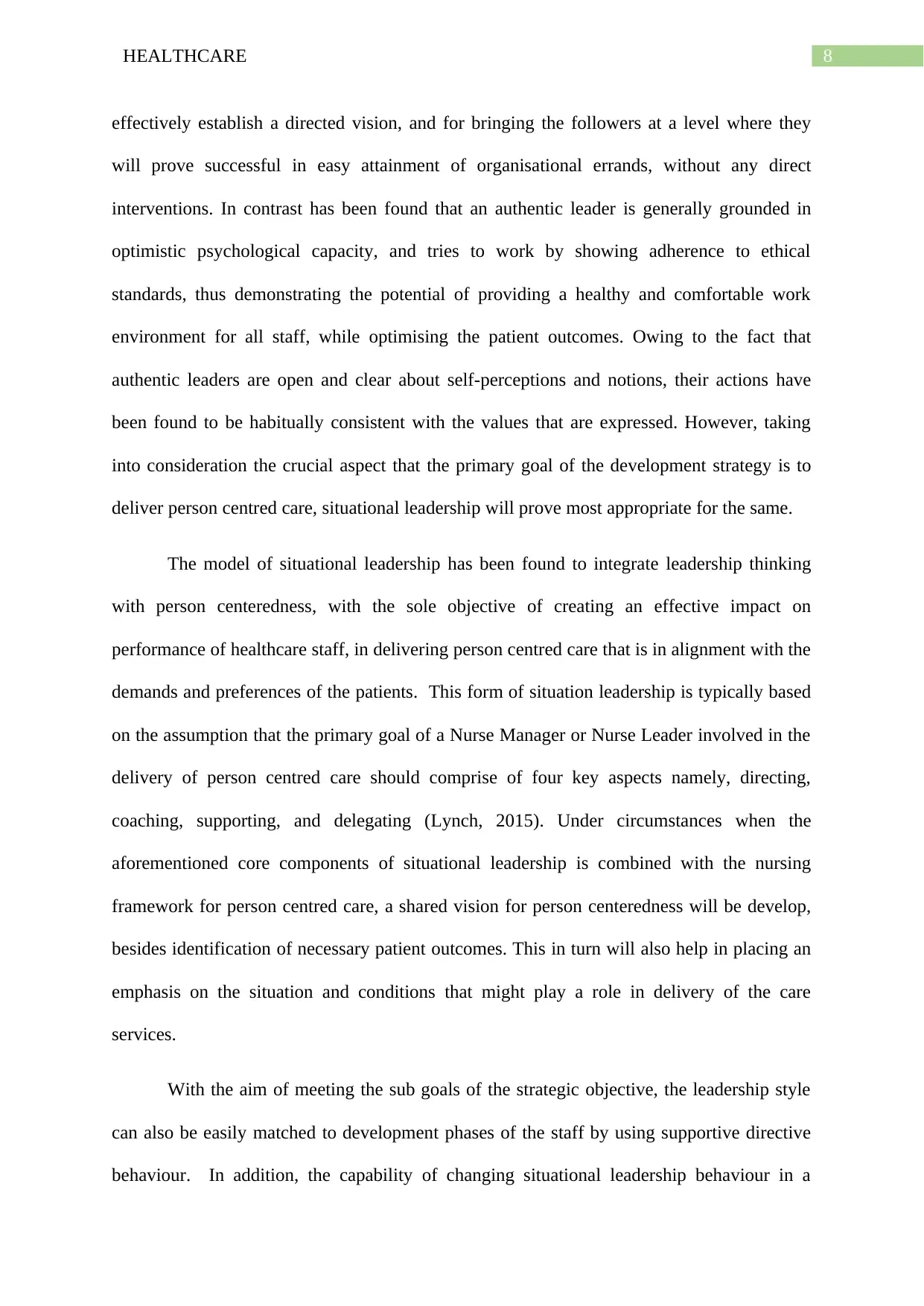
8HEALTHCARE
effectively establish a directed vision, and for bringing the followers at a level where they
will prove successful in easy attainment of organisational errands, without any direct
interventions. In contrast has been found that an authentic leader is generally grounded in
optimistic psychological capacity, and tries to work by showing adherence to ethical
standards, thus demonstrating the potential of providing a healthy and comfortable work
environment for all staff, while optimising the patient outcomes. Owing to the fact that
authentic leaders are open and clear about self-perceptions and notions, their actions have
been found to be habitually consistent with the values that are expressed. However, taking
into consideration the crucial aspect that the primary goal of the development strategy is to
deliver person centred care, situational leadership will prove most appropriate for the same.
The model of situational leadership has been found to integrate leadership thinking
with person centeredness, with the sole objective of creating an effective impact on
performance of healthcare staff, in delivering person centred care that is in alignment with the
demands and preferences of the patients. This form of situation leadership is typically based
on the assumption that the primary goal of a Nurse Manager or Nurse Leader involved in the
delivery of person centred care should comprise of four key aspects namely, directing,
coaching, supporting, and delegating (Lynch, 2015). Under circumstances when the
aforementioned core components of situational leadership is combined with the nursing
framework for person centred care, a shared vision for person centeredness will be develop,
besides identification of necessary patient outcomes. This in turn will also help in placing an
emphasis on the situation and conditions that might play a role in delivery of the care
services.
With the aim of meeting the sub goals of the strategic objective, the leadership style
can also be easily matched to development phases of the staff by using supportive directive
behaviour. In addition, the capability of changing situational leadership behaviour in a
effectively establish a directed vision, and for bringing the followers at a level where they
will prove successful in easy attainment of organisational errands, without any direct
interventions. In contrast has been found that an authentic leader is generally grounded in
optimistic psychological capacity, and tries to work by showing adherence to ethical
standards, thus demonstrating the potential of providing a healthy and comfortable work
environment for all staff, while optimising the patient outcomes. Owing to the fact that
authentic leaders are open and clear about self-perceptions and notions, their actions have
been found to be habitually consistent with the values that are expressed. However, taking
into consideration the crucial aspect that the primary goal of the development strategy is to
deliver person centred care, situational leadership will prove most appropriate for the same.
The model of situational leadership has been found to integrate leadership thinking
with person centeredness, with the sole objective of creating an effective impact on
performance of healthcare staff, in delivering person centred care that is in alignment with the
demands and preferences of the patients. This form of situation leadership is typically based
on the assumption that the primary goal of a Nurse Manager or Nurse Leader involved in the
delivery of person centred care should comprise of four key aspects namely, directing,
coaching, supporting, and delegating (Lynch, 2015). Under circumstances when the
aforementioned core components of situational leadership is combined with the nursing
framework for person centred care, a shared vision for person centeredness will be develop,
besides identification of necessary patient outcomes. This in turn will also help in placing an
emphasis on the situation and conditions that might play a role in delivery of the care
services.
With the aim of meeting the sub goals of the strategic objective, the leadership style
can also be easily matched to development phases of the staff by using supportive directive
behaviour. In addition, the capability of changing situational leadership behaviour in a
⊘ This is a preview!⊘
Do you want full access?
Subscribe today to unlock all pages.

Trusted by 1+ million students worldwide
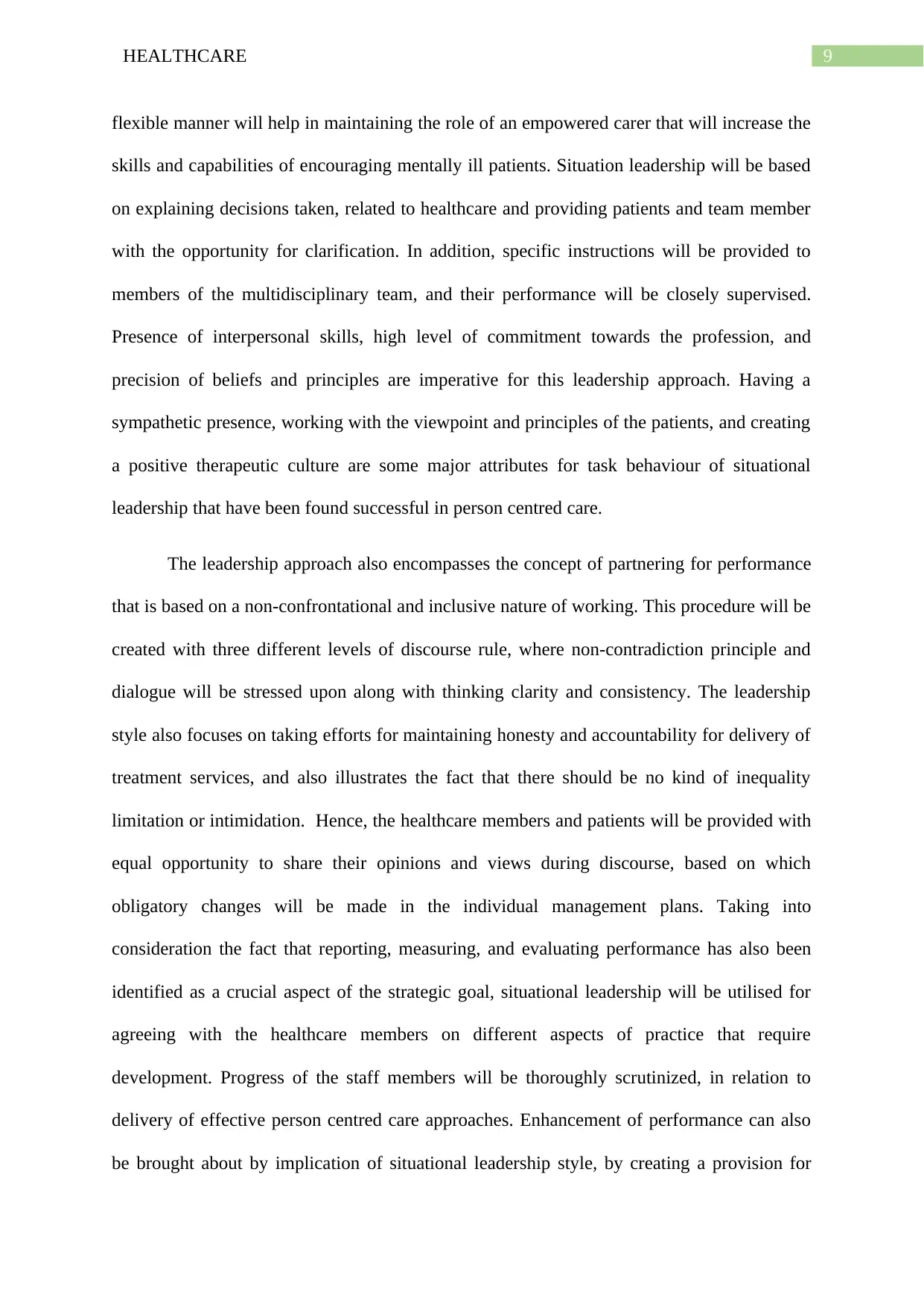
9HEALTHCARE
flexible manner will help in maintaining the role of an empowered carer that will increase the
skills and capabilities of encouraging mentally ill patients. Situation leadership will be based
on explaining decisions taken, related to healthcare and providing patients and team member
with the opportunity for clarification. In addition, specific instructions will be provided to
members of the multidisciplinary team, and their performance will be closely supervised.
Presence of interpersonal skills, high level of commitment towards the profession, and
precision of beliefs and principles are imperative for this leadership approach. Having a
sympathetic presence, working with the viewpoint and principles of the patients, and creating
a positive therapeutic culture are some major attributes for task behaviour of situational
leadership that have been found successful in person centred care.
The leadership approach also encompasses the concept of partnering for performance
that is based on a non-confrontational and inclusive nature of working. This procedure will be
created with three different levels of discourse rule, where non-contradiction principle and
dialogue will be stressed upon along with thinking clarity and consistency. The leadership
style also focuses on taking efforts for maintaining honesty and accountability for delivery of
treatment services, and also illustrates the fact that there should be no kind of inequality
limitation or intimidation. Hence, the healthcare members and patients will be provided with
equal opportunity to share their opinions and views during discourse, based on which
obligatory changes will be made in the individual management plans. Taking into
consideration the fact that reporting, measuring, and evaluating performance has also been
identified as a crucial aspect of the strategic goal, situational leadership will be utilised for
agreeing with the healthcare members on different aspects of practice that require
development. Progress of the staff members will be thoroughly scrutinized, in relation to
delivery of effective person centred care approaches. Enhancement of performance can also
be brought about by implication of situational leadership style, by creating a provision for
flexible manner will help in maintaining the role of an empowered carer that will increase the
skills and capabilities of encouraging mentally ill patients. Situation leadership will be based
on explaining decisions taken, related to healthcare and providing patients and team member
with the opportunity for clarification. In addition, specific instructions will be provided to
members of the multidisciplinary team, and their performance will be closely supervised.
Presence of interpersonal skills, high level of commitment towards the profession, and
precision of beliefs and principles are imperative for this leadership approach. Having a
sympathetic presence, working with the viewpoint and principles of the patients, and creating
a positive therapeutic culture are some major attributes for task behaviour of situational
leadership that have been found successful in person centred care.
The leadership approach also encompasses the concept of partnering for performance
that is based on a non-confrontational and inclusive nature of working. This procedure will be
created with three different levels of discourse rule, where non-contradiction principle and
dialogue will be stressed upon along with thinking clarity and consistency. The leadership
style also focuses on taking efforts for maintaining honesty and accountability for delivery of
treatment services, and also illustrates the fact that there should be no kind of inequality
limitation or intimidation. Hence, the healthcare members and patients will be provided with
equal opportunity to share their opinions and views during discourse, based on which
obligatory changes will be made in the individual management plans. Taking into
consideration the fact that reporting, measuring, and evaluating performance has also been
identified as a crucial aspect of the strategic goal, situational leadership will be utilised for
agreeing with the healthcare members on different aspects of practice that require
development. Progress of the staff members will be thoroughly scrutinized, in relation to
delivery of effective person centred care approaches. Enhancement of performance can also
be brought about by implication of situational leadership style, by creating a provision for
Paraphrase This Document
Need a fresh take? Get an instant paraphrase of this document with our AI Paraphraser
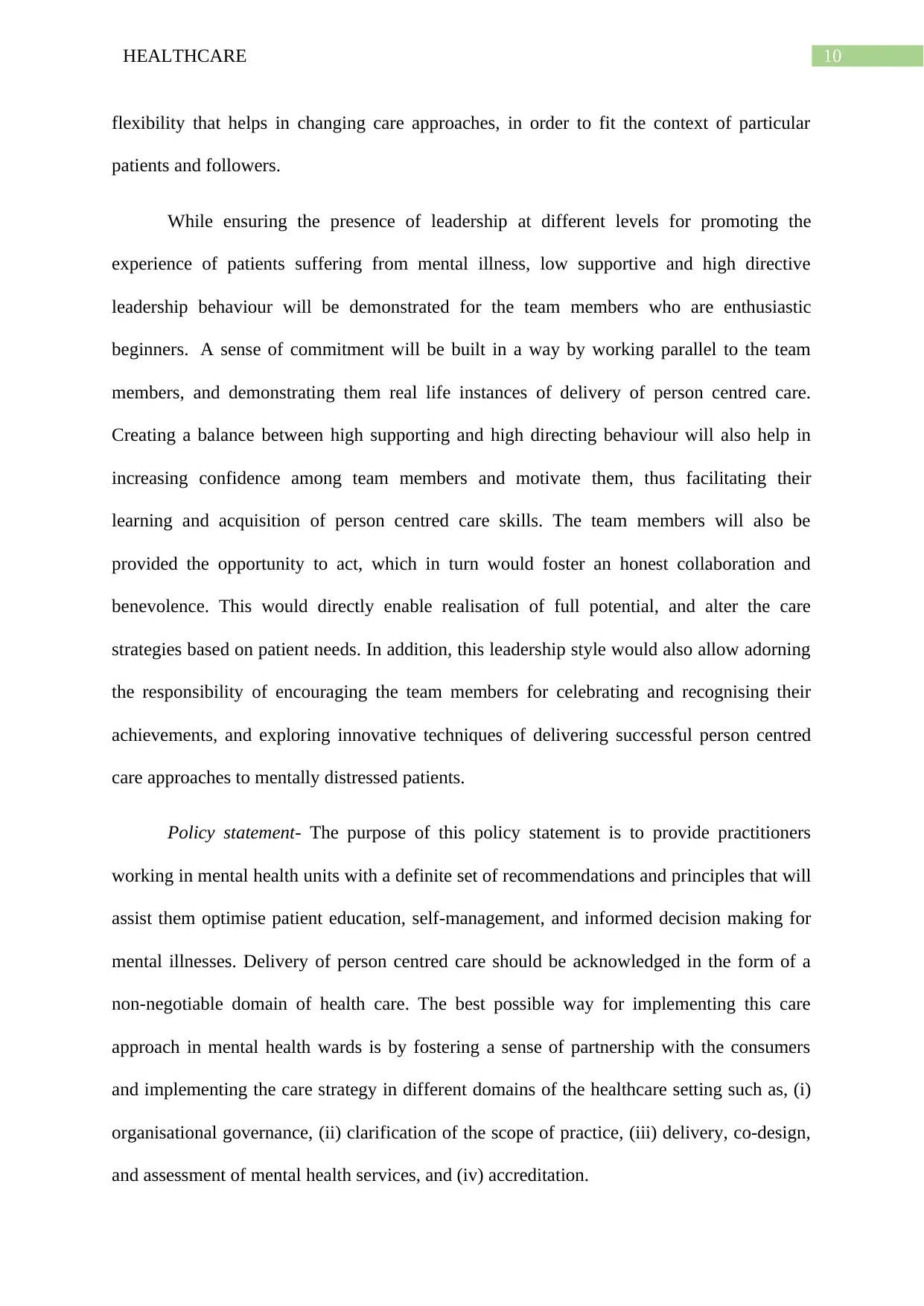
10HEALTHCARE
flexibility that helps in changing care approaches, in order to fit the context of particular
patients and followers.
While ensuring the presence of leadership at different levels for promoting the
experience of patients suffering from mental illness, low supportive and high directive
leadership behaviour will be demonstrated for the team members who are enthusiastic
beginners. A sense of commitment will be built in a way by working parallel to the team
members, and demonstrating them real life instances of delivery of person centred care.
Creating a balance between high supporting and high directing behaviour will also help in
increasing confidence among team members and motivate them, thus facilitating their
learning and acquisition of person centred care skills. The team members will also be
provided the opportunity to act, which in turn would foster an honest collaboration and
benevolence. This would directly enable realisation of full potential, and alter the care
strategies based on patient needs. In addition, this leadership style would also allow adorning
the responsibility of encouraging the team members for celebrating and recognising their
achievements, and exploring innovative techniques of delivering successful person centred
care approaches to mentally distressed patients.
Policy statement- The purpose of this policy statement is to provide practitioners
working in mental health units with a definite set of recommendations and principles that will
assist them optimise patient education, self-management, and informed decision making for
mental illnesses. Delivery of person centred care should be acknowledged in the form of a
non-negotiable domain of health care. The best possible way for implementing this care
approach in mental health wards is by fostering a sense of partnership with the consumers
and implementing the care strategy in different domains of the healthcare setting such as, (i)
organisational governance, (ii) clarification of the scope of practice, (iii) delivery, co-design,
and assessment of mental health services, and (iv) accreditation.
flexibility that helps in changing care approaches, in order to fit the context of particular
patients and followers.
While ensuring the presence of leadership at different levels for promoting the
experience of patients suffering from mental illness, low supportive and high directive
leadership behaviour will be demonstrated for the team members who are enthusiastic
beginners. A sense of commitment will be built in a way by working parallel to the team
members, and demonstrating them real life instances of delivery of person centred care.
Creating a balance between high supporting and high directing behaviour will also help in
increasing confidence among team members and motivate them, thus facilitating their
learning and acquisition of person centred care skills. The team members will also be
provided the opportunity to act, which in turn would foster an honest collaboration and
benevolence. This would directly enable realisation of full potential, and alter the care
strategies based on patient needs. In addition, this leadership style would also allow adorning
the responsibility of encouraging the team members for celebrating and recognising their
achievements, and exploring innovative techniques of delivering successful person centred
care approaches to mentally distressed patients.
Policy statement- The purpose of this policy statement is to provide practitioners
working in mental health units with a definite set of recommendations and principles that will
assist them optimise patient education, self-management, and informed decision making for
mental illnesses. Delivery of person centred care should be acknowledged in the form of a
non-negotiable domain of health care. The best possible way for implementing this care
approach in mental health wards is by fostering a sense of partnership with the consumers
and implementing the care strategy in different domains of the healthcare setting such as, (i)
organisational governance, (ii) clarification of the scope of practice, (iii) delivery, co-design,
and assessment of mental health services, and (iv) accreditation.
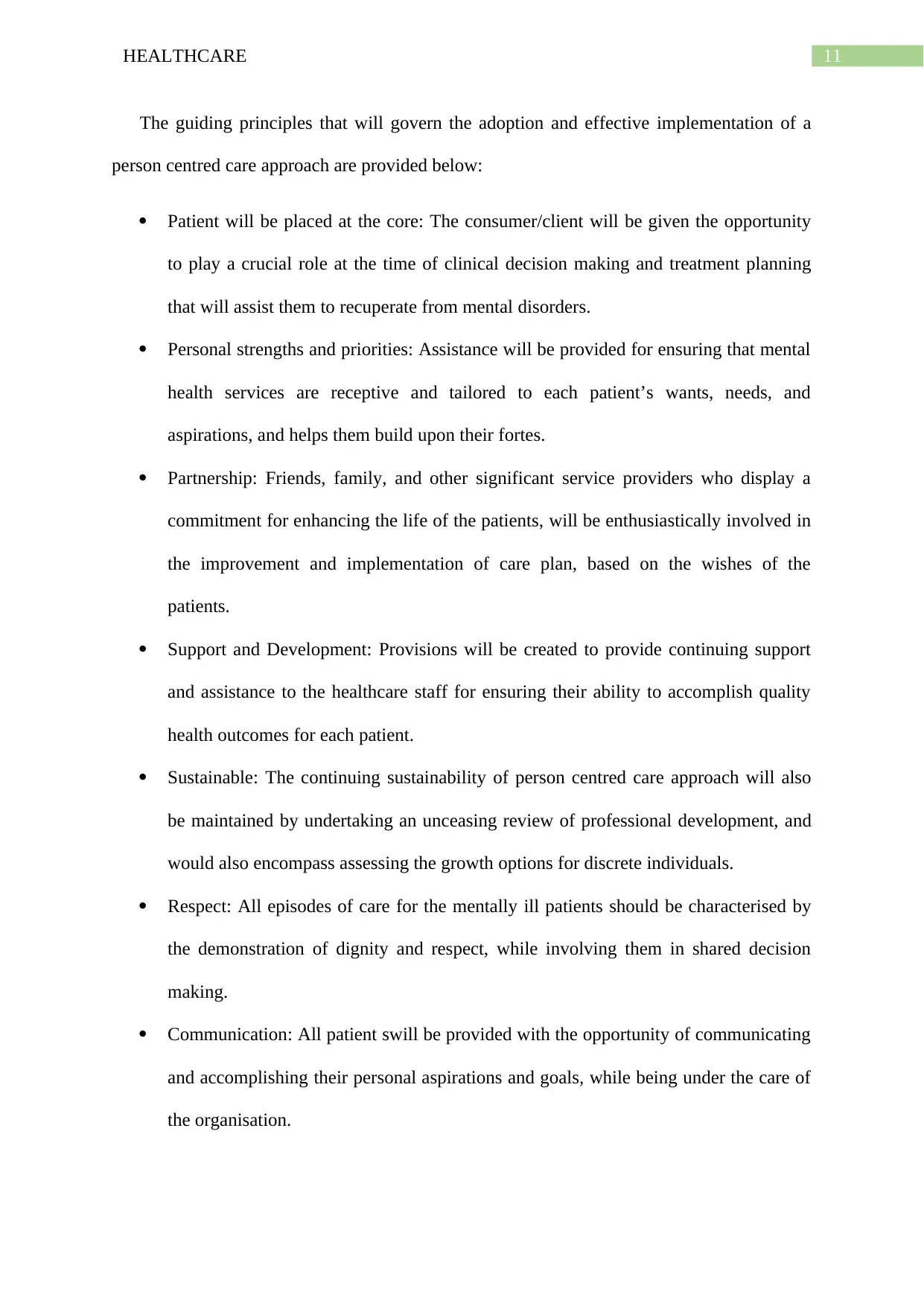
11HEALTHCARE
The guiding principles that will govern the adoption and effective implementation of a
person centred care approach are provided below:
Patient will be placed at the core: The consumer/client will be given the opportunity
to play a crucial role at the time of clinical decision making and treatment planning
that will assist them to recuperate from mental disorders.
Personal strengths and priorities: Assistance will be provided for ensuring that mental
health services are receptive and tailored to each patient’s wants, needs, and
aspirations, and helps them build upon their fortes.
Partnership: Friends, family, and other significant service providers who display a
commitment for enhancing the life of the patients, will be enthusiastically involved in
the improvement and implementation of care plan, based on the wishes of the
patients.
Support and Development: Provisions will be created to provide continuing support
and assistance to the healthcare staff for ensuring their ability to accomplish quality
health outcomes for each patient.
Sustainable: The continuing sustainability of person centred care approach will also
be maintained by undertaking an unceasing review of professional development, and
would also encompass assessing the growth options for discrete individuals.
Respect: All episodes of care for the mentally ill patients should be characterised by
the demonstration of dignity and respect, while involving them in shared decision
making.
Communication: All patient swill be provided with the opportunity of communicating
and accomplishing their personal aspirations and goals, while being under the care of
the organisation.
The guiding principles that will govern the adoption and effective implementation of a
person centred care approach are provided below:
Patient will be placed at the core: The consumer/client will be given the opportunity
to play a crucial role at the time of clinical decision making and treatment planning
that will assist them to recuperate from mental disorders.
Personal strengths and priorities: Assistance will be provided for ensuring that mental
health services are receptive and tailored to each patient’s wants, needs, and
aspirations, and helps them build upon their fortes.
Partnership: Friends, family, and other significant service providers who display a
commitment for enhancing the life of the patients, will be enthusiastically involved in
the improvement and implementation of care plan, based on the wishes of the
patients.
Support and Development: Provisions will be created to provide continuing support
and assistance to the healthcare staff for ensuring their ability to accomplish quality
health outcomes for each patient.
Sustainable: The continuing sustainability of person centred care approach will also
be maintained by undertaking an unceasing review of professional development, and
would also encompass assessing the growth options for discrete individuals.
Respect: All episodes of care for the mentally ill patients should be characterised by
the demonstration of dignity and respect, while involving them in shared decision
making.
Communication: All patient swill be provided with the opportunity of communicating
and accomplishing their personal aspirations and goals, while being under the care of
the organisation.
⊘ This is a preview!⊘
Do you want full access?
Subscribe today to unlock all pages.

Trusted by 1+ million students worldwide
1 out of 17
Related Documents
Your All-in-One AI-Powered Toolkit for Academic Success.
+13062052269
info@desklib.com
Available 24*7 on WhatsApp / Email
![[object Object]](/_next/static/media/star-bottom.7253800d.svg)
Unlock your academic potential
Copyright © 2020–2026 A2Z Services. All Rights Reserved. Developed and managed by ZUCOL.





